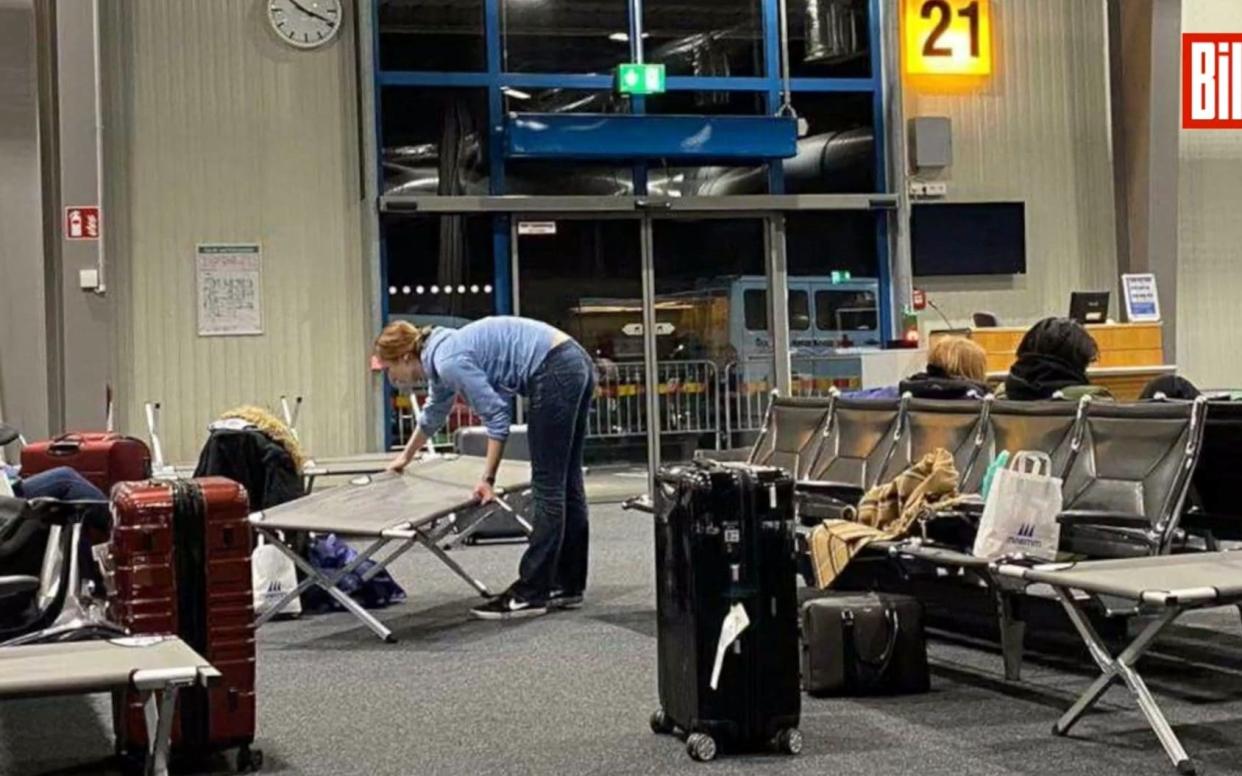EU could ban UK flights over Covid strain as Britons are forced to sleep on the floor of German airports

Fears are mounting the EU could impose a blanket ban on UK flights over the holiday season as British travellers were left stranded in airports over confusion caused by a new, more infectious strain of the coronavirus.
Berlin will push for a complete pause on all entry from the UK via air, sea and road terminals to European countries, according to German tabloid Bild.
The country called a crisis meeting of EU members on Monday to push for a coordinated response over the new strain.
A rapid string of travel bans against Britain caused panic and confusion at airports as European countries scrambled to unify their response days before the Christmas holidays.
Over the weekend, nearly 20 EU countries including France, Germany and Belgium banned flights and most freight lorries, train and ferries from the UK and further bans were imposed by Israel, Canada, Chile and India. The ban could be extended to all 27 EU countries following Monday's meeting.
The restrictions caused chaos for travellers. British nationals arriving on the last flights into Germany on Sunday evening were forced to camp out overnight in airport terminals after German authorities refused them entry into the country.
Passengers reported delays and confusion upon arrival, with border police at Berlin Airport initially announcing that all non-German nationals would be put on planes back to the UK. Non-Germans with residency in the country were eventually allowed over the border, and one passenger at Hannover Airport subsequently tested positive for the virus.
The new strain has already been found in the Netherlands, Denmark, Belgium and as far as Australia. On Sunday, the Italian health ministry said a doctor had been hospitalised with the new strain with mild symptoms after returning from the UK.
Roberto Speranza, Italy's health minister, says the new strain is "worrying" but adds that it does not seem to be any more lethal than existing ones. "The first indications are that it seems the virus is not more harmful but it is more contagious and this is a serious problem," he said. "It travels faster, but it is not more lethal."
A lack of virus sequence testing outside of Britain also meant the new strain could already be circulating more widely undetected, the European Centre for Disease Prevention and Control said in a report.
Spain and Germany's health minister both sought to reassure the public by announcing there had been no detected cases of the new strain and that it would not impact the effectiveness of vaccines.
In another feat of European coordination, the bloc's drug regulator is expected to approve the Covid-19 vaccine developed by US company Pfizer and its German partner BioNTech. If approved, vaccinations could start as early as next week.
European countries have significantly ramped up lockdown measures over the holiday period over fears of a third wave of infections ahead of widespread vaccination campaigns.
The most dramatic intervention came from France, which put in place a ban on hauliers crossing the English Channel with their cargo. .
"It's a tough measure because this is about protecting public health. We opted, like many European countries […] to suspend all transport links from Britain for this 48-hour period," France's Europe minister Clément Beaune said.
"This is 48 hours in which we will do three things: clarify the scientific information […]; coordinate better at a European level […]; and find solutions for the French citizens in the UK," France's Europe minister Clément Beaune said.
The bans were triggered after Britain alerted the World Health Organization to the new variant, which the Prime Minister warned was up to 70 per cent more transmissible than earlier strains.

